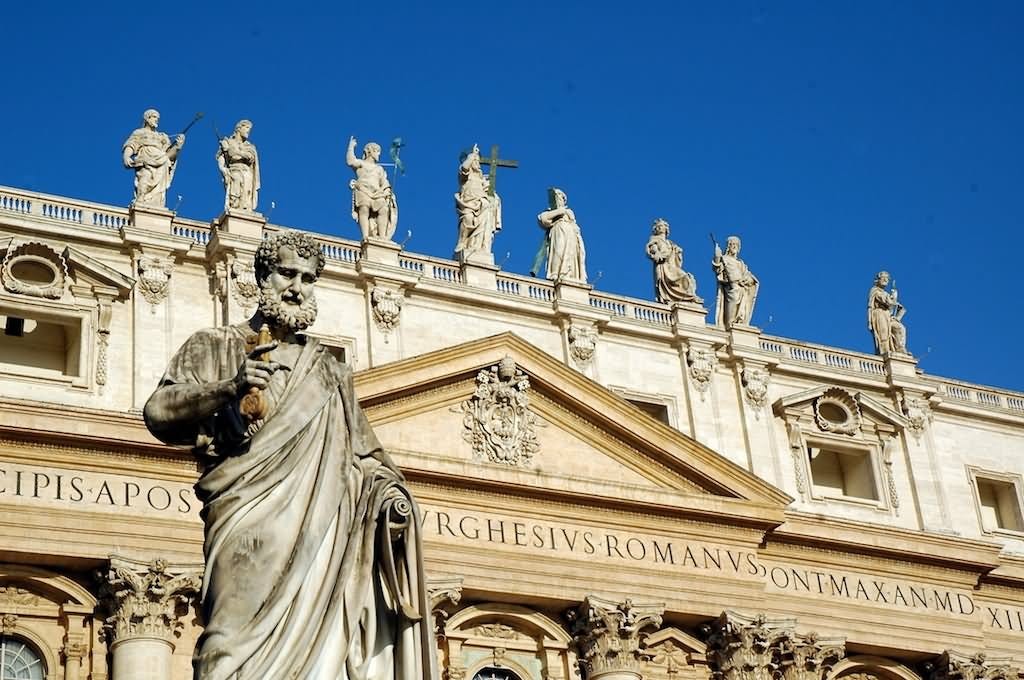Guarding the Gates of Hell
When Peter lifts his eyes to heaven, we are spared the full brunt of Satan’s assaults.
Thou art Peter; and upon this rock I will build my church, and the gates of hell shall not prevail against it. ~ Matthew 16:18
The temple of Solomon was built on a very special rock. The Foundation Stone was considered the center of all creation—a junction between heaven and earth.
As Jeff Cavins notes, the Jews also believed that the rock served to cover and hence plug the gates of hell. So long as God was worshipped there as his covenant demanded, those gates could remain (more or less) sealed, and humanity could be spared a full frontal assault from our very worst enemies.
Speaking of this same rock, Isaiah explains that the Lord sometimes chooses certain of his servants to exercise power over it. When he lays “the key of the house of David” upon their shoulders, they acquire the authority to open and shut the gates of heaven, and guard those of hell (Is. 22:15-22).
Such a servant is to be “a peg in a sure place.” If that “peg be removed,” all hell may break loose, “and that which hung thereon, shall perish” (Is. 22:23-25).
In Caesarea Philippi, the Lord gives to Peter and his successors the keys to heaven, and with them the duty to guard the gates of hell (Mt. 16:19).
The rock upon which Peter was to exercise this authority is not the stone of Mount Moriah, whose temple the Romans were soon to destroy. Rather, the temple over which Peter is to preside, whose Rock (Christ) will deter the forces of hell, is one in which we worship “in spirit and in truth” (Jn. 4:24).
In sum, that means that we worship in communion with Christ’s Vicar on earth, and in full adherence to the truths he has been commissioned to guard.
Peter receives this monumental commission after proclaiming Jesus to be “Christ, the Son of the living God,” a truth not revealed to him by “flesh and blood,” “but by [our] Father who is in heaven” (Mt. 16:16-17).
Moments later, Christ makes it clear that this authority—as with all human authority—is conditional, when he rebukes Peter for causing scandal. Confronted with the necessity for Christ’s Passion, Peter momentarily opted to favor “the things that are of men” instead of “the things that are of God” (Mt. 16:23).
He was corrected; and being converted, has the duty to confirm his brethren (Luke 22:32).
Today, the state of the world demonstrates that there is no shortage of demons spilling forth from their infernal abode. This does not mean, of course, that things could not be far worse, as the true optimist will always remind us.
Those of us not entrusted with Peter’s herculean charge can do little to regulate such dangers at their source. In brief, we must each take up our cross in whatever conditions obtain here and now (Mt. 16:24).
On this feast of St. Peter’s Chair (that is, his throne), and with our present Holy Father suffering from physical and (one must imagine) spiritual afflictions, let’s not forget to offer up sacrifices for the servant of the servants of God, whose post is upon the Rock facing heaven and covering the netherworld.
When Peter lifts his eyes to heaven, we are spared the full brunt of Satan’s assaults. When he turns his gaze to “the things that are of men,” the battle intensifies.
What Peter does from day to day is a matter of no small moment. Yet the doctrine Peter has perennially published teaches that, regardless of any such details, one day “the Son of man shall come in the glory of his Father” (Mt. 16:27), and all shall be well for them “that love his coming” (2 Tim. 4:8).
If you enjoyed these reflections, please forward to a friend!







